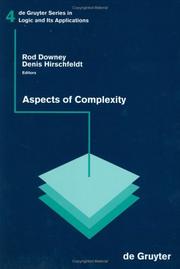| Listing 1 - 2 of 2 |
Sort by
|

ISBN: 311088917X 9783110889178 3110168103 9783110168105 Year: 2001 Publisher: Berlin New York Walter de Gruyter
Abstract | Keywords | Export | Availability | Bookmark
 Loading...
Loading...Choose an application
- Reference Manager
- EndNote
- RefWorks (Direct export to RefWorks)
The book contains 8 detailed expositions of the lectures given at the Kaikoura 2000 Workshop on Computability, Complexity, and Computational Algebra. Topics covered include basic models and questions of complexity theory, the Blum-Shub-Smale model of computation, probability theory applied to algorithmics (randomized alogrithms), parametric complexity, Kolmogorov complexity of finite strings, computational group theory, counting problems, and canonical models of ZFC providing a solution to continuum hypothesis. The text addresses students in computer science or mathematics, and professionals i
Book
ISBN: 9780387684413 9780387571850 9780387955674 9781493938209 0387955674 9786613568786 1280390867 0387684417 Year: 2010 Publisher: New York, NY : Springer New York : Imprint: Springer,
Abstract | Keywords | Export | Availability | Bookmark
 Loading...
Loading...Choose an application
- Reference Manager
- EndNote
- RefWorks (Direct export to RefWorks)
Intuitively, a sequence such as 101010101010101010… does not seem random, whereas 101101011101010100…, obtained using coin tosses, does. How can we reconcile this intuition with the fact that both are statistically equally likely? What does it mean to say that an individual mathematical object such as a real number is random, or to say that one real is more random than another? And what is the relationship between randomness and computational power. The theory of algorithmic randomness uses tools from computability theory and algorithmic information theory to address questions such as these. Much of this theory can be seen as exploring the relationships between three fundamental concepts: relative computability, as measured by notions such as Turing reducibility; information content, as measured by notions such as Kolmogorov complexity; and randomness of individual objects, as first successfully defined by Martin-Löf. Although algorithmic randomness has been studied for several decades, a dramatic upsurge of interest in the area, starting in the late 1990s, has led to significant advances. This is the first comprehensive treatment of this important field, designed to be both a reference tool for experts and a guide for newcomers. It surveys a broad section of work in the area, and presents most of its major results and techniques in depth. Its organization is designed to guide the reader through this large body of work, providing context for its many concepts and theorems, discussing their significance, and highlighting their interactions. It includes a discussion of effective dimension, which allows us to assign concepts like Hausdorff dimension to individual reals, and a focused but detailed introduction to computability theory. It will be of interest to researchers and students in computability theory, algorithmic information theory, and theoretical computer science.
Complex analysis --- Computer science --- Computer. Automation --- toegepaste informatica --- complexe analyse (wiskunde) --- computers --- algoritmen --- Computable functions. --- Computational complexity. --- Algorithms. --- Computers. --- Algorithm Analysis and Problem Complexity. --- Theory of Computation. --- Computation by Abstract Devices. --- Automatic computers --- Automatic data processors --- Computer hardware --- Computing machines (Computers) --- Electronic brains --- Electronic calculating-machines --- Electronic computers --- Hardware, Computer --- Computer systems --- Cybernetics --- Machine theory --- Calculators --- Cyberspace --- Algorism --- Algebra --- Arithmetic --- Foundations
| Listing 1 - 2 of 2 |
Sort by
|

 Search
Search Feedback
Feedback About UniCat
About UniCat  Help
Help News
News